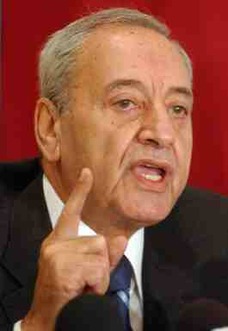Berri Warns 'Obstruction' of Oil Exploration 'Serves Israel'
إقرأ هذا الخبر بالعربية
Speaker Nabih Berri has warned that any “obstruction” in the oil and gas exploration file would “serve Israel's interest,” vowing that he would not remain silent over any such attempt.
“There is something suspicious in this regard and the obstruction of the oil exploration file would serve Israel's interest,” cautioned Berri in remarks published Monday in al-Joumhouria newspaper.
He expressed concern that “some malicious hands could be manipulating things in Israel's favor” and that “some Lebanese might be bowing to this obstruction.”
“I don't want to accuse anyone, but I don't understand why anyone would obstruct the oil exploration file and why they would seek to serve Israel's interest,” Berri added.
“Things were moving forward normally, but someone has suddenly backed down. Was it their own decision or someone has pressed them to backpedal and obstruct?” Berri went on to say.
Stressing that the issue is “very crucial for Lebanon,” the speaker warned that “the renewed obstruction would lead to a major problem in the country.”
“Let them know that I won't remain silent. This issue must move forward because it contains a vital interest for the country,” Berri said.
Prime Minister Tammam Salam has announced that he will not convene the oil ministerial committee before gathering “all the data” about the issue of offshore oil and gas exploration, noting that the file requires “high readiness on all levels.”
Lebanon and Israel are bickering over a zone that consists of about 854 square kilometers and suspected energy reserves that could generate billions of dollars.
Lebanon has been slow to exploit its maritime resources compared with other eastern Mediterranean countries. Israel, Cyprus and Turkey are all much more advanced in drilling for oil and gas.
In March 2010, the U.S. Geological Survey estimated a mean of 1.7 billion barrels of recoverable oil and a mean of 34.5 trillion cubic meters of recoverable gas in the Levant Basin in the eastern Mediterranean, which includes the territorial waters of Lebanon, Israel, Syria and Cyprus.
In August 2014, the government postponed for the fifth time the first round of licensing for gas exploration over a political dispute.
The disagreements were over the designation of blocks open for bidding and the terms of a draft exploration agreement.
Lebanese officials have continuously warned that Israel's exploration of new offshore gas fields near Lebanese territorial waters means that Israel is siphoning some of Lebanon's crude oil.



